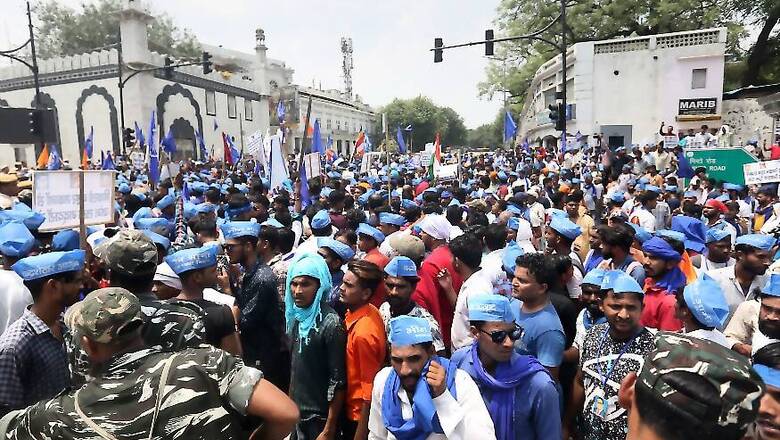
views
New Delhi: On February 9, a day after assembly polls in Delhi, the Ravidas Dharmsthan trust at RK Puram will celebrate the poet-saint’s birth anniversary. Busy with preparations is office-bearer Premjit who says political leaders from various parties have visited to woo the disciples, a section of the Dalit community. The strategy of fighting the demolition of the Shri Guru Ravidas temple at Tughlaqabad in August 2019 – by the Delhi Development Authority following Supreme Court orders – was designed the at RK Puram trust.
According to folklore, the social reformer and spiritual figure Guru Ravidas visited the place where the shrine stood around 1509 during the reign of Sikandar Lodhi. His followers formed the Ravidassia religion, a spin-off from Sikhism, in the 21st century. Following the demolition, Dalits staged a massive protest and demanded that the temple be rebuilt at the site where it stood for over five centuries. Consultations are on to build a new temple.
Ahead of casting his vote, Premjit said, “Dalits in Delhi have come from Punjab and other regions. We have been pro-Congress. But quite recently, the Dalits have shown favour to AAP. The Hindutva pitch has not appealed. However, I can’t speak for the new generation that has access to technology and information.”
Analysts say the Congress, which ruled Delhi for three consecutive terms from 1998 to 2013, had developed a captive vote bank with members of the weaker sections including Dalits at the core. While the Bahujan Samaj Party (BSP) led by Mayawati managed to take on the role of a champion of the backward castes in adjoining Uttar Pradesh, it could not dent the hold of the Congress under late chief minister Sheila Diskhit over the disadvantaged sections.
However, the Congress’s lackadaisical campaign in Delhi this time means those votes could be up for grabs, analysts say. Of the 12 assembly constituencies reserved for disadvantaged sections in Delhi, only one, Gokalpuri, had a BSP MLA in 2008. According to psephologist Sanjay Kumar, the BSP’s vote share improved from the 1998 election and it performed well in 2008. Analyses of recent reports show the party bagged 14.05% of votes that year and has not repeated or surpassed that figure. Polls since then have seen either the Congress or Aam Aadmi Party (AAP) bag the Gokalpuri seat.
The remaining 11 reserved constituencies have not witnessed any impressive performances by the BSP, or the Bharatiya Janata Party (BJP) since 1993.
The BSP has put up candidates on all 70 assembly seats in Delhi this time across castes and communities. With an over 20-lakh Dalit population and 12 reserved seats, Delhi BSP chief Laxman Singh told IANS last month: “If only Dalits vote for the party we do not require anybody else.” But that model of caste politics is absent in Delhi elections, observers say. Activist Ashok Bharti, who is chairman of the All India Ambedkar Mahasabha, and founding chairman of the National Confederation of Dalit & Adivasi Organisations (NACDAOR), said, “Caste politics is absent in Delhi but caste affinities exist. Though the Congress is missing in action to woo them, or other voters, the Dalits are likely to repeat their support for AAP. The driving thought behind pressing the button is to defeat the BJP. The Congress vote shifted to AAP for the same reason. For Dalits, what is development? What can other parties do? For now, the agenda is to safeguard constitutional morality.”
Three years ago, the BSP tried to woo the Dalit voters in Delhi. The party also got votes, but Dalits were largely in favour of AAP, “which pushed the class notion and pro-poor agenda. The sway seems to be in favour of AAP,” said Badri Narayan, professor at GB Pant Social Science Institute, Allahabad.
Fragmented identity
Surinder S Jodhka, professor of social science at Delhi’s Jawaharlal Nehru University, said Dalits are in great diversity in the capital and their voting pattern cannot be compared with that of Uttar Pradesh’s Dalits. “UP has a Dalit party which is not there in Delhi. Delhi does not have a single cluster of caste unlike UP and Punjab. Here everyone is a migrant.”
The Dalits in Delhi’s melting pot are a fragmented lot beyond the lug of identity politics, say analysts.
“What we see in Delhi is diversity of mobility, which means there are Dalits representing various occupations though there are some occupations still reserved for Dalits and Muslims that others won’t do,” said Jodhka, explaining that this diversity defines Dalit voting pattern. “It is community identity that gets mobilised by different groups in different localities. Voting pattern is more community-specific than caste-specific.”
Cheap electricity and water a big draw
At the Ravidas Dharmsthan trust, Premjit’s colleagues appear happy with lower water and electricity bills that have been a key poll plank of the ruling AAP. “The regular hassles have been sorted. We don’t have to worry about the swelling electricity bills. It’s a great relief and affects all the people in Delhi alike,” says one of them.
The polarisation around the Shaheen Bagh protests against the Citizenship (Amendment) Acts does not seem to have affected Dalits in Delhi. The Ravidassias in Delhi are influenced by BR Ambedkar, and the BJP’s Hindutva push does not appeal to them, while the Valmikis have been Hinduised – the name was given to them by Arya Samaj/Hindu Mahasabha – added Jodhka, and might identify as Hindus.
“Dalits are not the social base of Hindutva and even if any Dalit leaders are part of a BJP government, they will distance themselves from the party’s ideology. They may go with the BJP if the opportunity arises because they might see it as a party with power,” Jodhka said.
Bharti, an activist, said AAP has not fulfilled all its promises of creating jobs and regularising contract workers. But, still to defeat the BJP, “Most Dalit votes would go to AAP or Congress.”
The AAP manifesto promises Rs 1 crore compensation to the family of a manual scavenger if he dies while performing his work. The national convenor of the Safai Karmachari Andolan, Bezwada Wilson, told News18.com that past promises have not been fulfilled, as out of 111 who died, kin of only 36 got rehabilitation.
“The broom (AAP’s election symbol) appeals to the Dalit community, and in the last two assembly elections, the vote was cast in favour of AAP in 2013 and 2015. But it has to fulfill the promises made,” said Wilson.
















Comments
0 comment